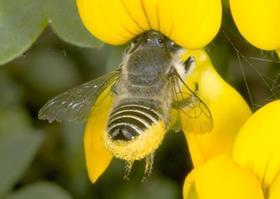
The UK will back further restrictions on neonicotinoid pesticides after growing evidence of the harmful effect on bee populations, the Defra secretary of state Michael Gove has announced.
Gove, who has been in the position since June, revealed the news in an article for the Guardian newspaper. He said that, since 2013, the evidence that neonics harm bee populations has grown and the risks that they pose are greater than previously understood.
He said he made his decision following a new report by the government’s advisory body on pesticides, which said scientific evidence now suggests the environmental risks posed by neonics – particularly to bees and pollinators – support the case for further restrictions.
“While there is still uncertainty in the science, it is increasingly pointing in one direction. Not to act would be to risk continuing down a course which could have extensive and permanent effects on bee populations,” he wrote.
“That is not a risk I am prepared to take, so the UK will be supporting further restrictions on neonicotinoids. Unless the evidence base changes again, the government will keep these restrictions in place after we have left the EU.”
The move reverses the previous position of the UK and Defra on neonics, which has previously been against further restrictions, and the NFU, which maintains that scientific evidence is not sufficient to warrant a ban.
“I asked the UK’s independent advisory body on pesticides to review the issue again,” Gove wrote. “They advise that the evidence now supports the restrictions introduced in 2013; indeed, there may also be a case for going further.”
“I recognise the impact further restrictions will have on farmers and I am keen to work with them to explore alternative approaches both now and as we design a new agricultural policy outside the European Union,” he said.
Gove has been vocal in support of environmental protection measures since joining Defra, having recently attended an event on soil health, and spoken regularly about his commitment to the environment.
Since December 2013, the EU has banned the use of three neonicotinoids – Clothianidin, Imidacloprid and Thiamethoxam – on a number of crops attractive to bees, such as oilseed rape.
The European Commission has proposed restricting the same three neonicotinoids to only allow their use on plants in glasshouses.
Currently, their use is banned for oilseed rape, spring cereals and sprays for winter cereals, but they can be used to treat sugar beet and as seed treatments for winter cereals.
The current process of EU emergency authorisations will remain in place, allowing the short-term, limited and controlled use of neonicotinoids in exceptional situations.
Defra’s chief scientific advisor professor Ian Boyd said: “The important question is whether neonicotinoid use results in harmful effects on populations of bees and other pollinators as a whole.
“Recent field-based experiments have suggested these effects could exist. In combination with the observation of widespread and increasing use of these chemicals, the available evidence justifies taking further steps to restrict the use of neonicotinoids.”



